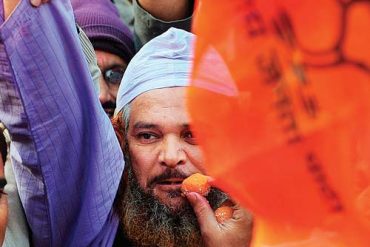New Delhi : The story of Gujarat is more about the triumph of politics of hatred, symbolised by Chief Minister Narendra Modi, than the development indicators he talks about, says social activist and National Advisory Council member Harsh Mander, who runs an NGO that helps survivors of the 2002 carnage.
“The story of Gujarat is more a tale of triumph of politics of hatred symbolised by Chief Minister Narendra Modi than the development indicators he talks about,” Mander said in an interview.
“The debate, whether the state’s responsibility is to deliver growth or to protect people, is being played out very dramatically there.”
Mander said the carnage “looked planned” as well as the “systemmatic subversion of justice” that followed it. He was then country head of NGO Action Aid on deputation to the state. He quit the Indian Administrative Service in March 2002 “to fight for the idea of India”.
“I wanted to defend the secular-democratic values which have been victorious for a long time…this could be done only outside the service,” said Mander whose NGO, Centre for Equity Studies, helps the survivors of Gujarat riots.
The activist said when he visited the historically prosperous state in western India shortly after the riots to provide humanitarian assistance to the survivors, he realised “the violence was state sponsored”.
“Just like the violence, subversion of the legal process too appeared to be planned. It showed in the way FIRs were written and cases were filed,” Mander told IANS.
“I could see an open role played by the state in enabling and facilitating the pogrom.”
The riots followed the day after the burning of the Sabarmati Express coach at Godhra Feb 27, 2002 in which 58 kar sevaks, or Hindu activists, returning from Ayodhya were killed. Over 1,000 people, mostly Muslims, were killed in the communal riots in its aftermath.
Mander said as a result of state apathy around half of the 200,000 violence affected people have still not been able to return to their roots and around 30,000 continue to live in relief camps while several others face socio-economic boycott.
Observing that “justice for the survivors seems distant”, the former bureaucrat expressed hope that civil society’s “systematic resistance” to “subversion of justice” in the past decade has ensured that the “system in Gujarat” is being made answerable.
“More than the final victory, the process of resistance is important…it is going to be a long battle,” said Mander.
“Riots divided the communities”, Mander said, adding “the past ten years have witnessed the culmination of an alternative vision of cultural subordination of the minorities.”
“This is unacceptable,” said Mander.
He said that Modi risked his entire political career by refusing to accept that the state failed to explore possibilities of reconciliation in the past decade.
Explaining his point, Mander said that instead of acknowledging the “state’s role in the riots, expressing remorse, pursuing reparation and ensuring justice,” the Modi administration “denied responsibility, showed pride, boycotted a particular community and subverted the justice system”.
IANS
The opinions, beliefs and viewpoints expressed by authors, news service providers on this page do not necessarily reflect the opinions, beliefs and viewpoints of Hill Post. Any views or opinions are not intended to malign any religion, ethnic group, club, organization, company, or individual.
Hill Post makes no representations as to the accuracy or completeness of any information on this site page.




I am totally against hatred against any community any where in the world. But I fail oi understand why have people like Harsh Mander forgotten all about communal riots in 1969 and in mid seventies during Congress rule in Gujarat, when thousands from minority community died in Ahmedabad alone. May be because there was limited access to Television then and the incidences have been conveniently buried. Social activists and media should know that by reminding about any ugly incidence over and over again, they perpetuate hatred and that helps no one. And that in my view is as irresponsible as supporting the riots.
What I don’t understand is that his deafening silence regarding the suffering of Hindus in Kashmir. When he has all the time espoused the cause of minorities in all the states, when it comes to suffering of Sikhs in the riots of 1984 or the Kashmiri Pandits who are not even able to return to their home state, not even a crocodile tear is shed by these so called saviours and protectors of Human rights. Perhaps Hindus are not humans in their eyes. Their sympathy is only for Muslims and Muslims alone.
Mr Mander seems to be paid by the congress. He is ready to ignore everything that congress has ever done, including sikh riots, Kashmiri pandit problem, bangladesh problem etc. He very conveniently ignores the politics of minority appeasement implemented by the congress nationwide. All he can see is Narendra Modi and our nation’s fake propaganda to admonish a leader that has transformed Gujrat.